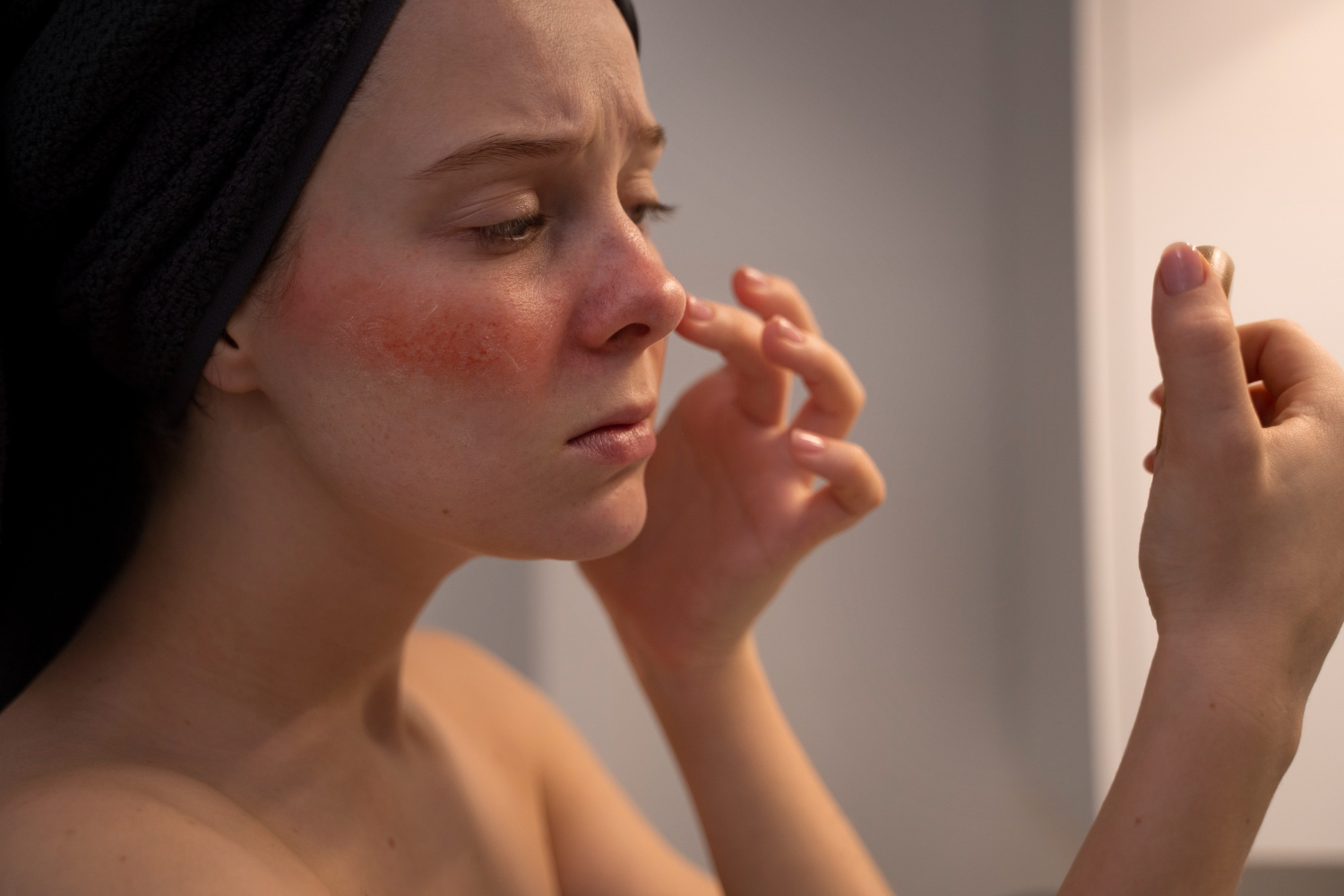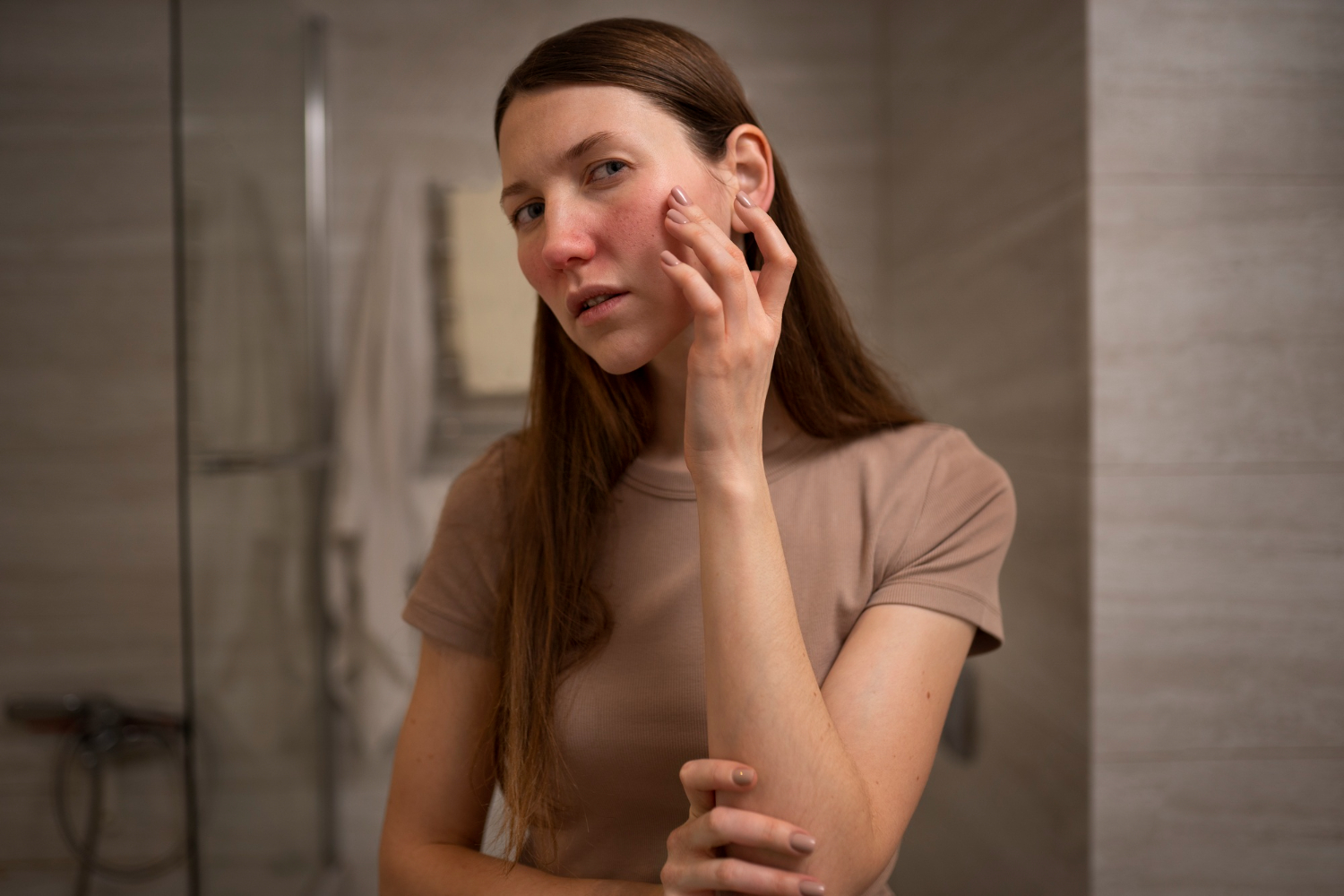Introduction
Skin redness is a common condition that can affect anyone, regardless of age or skin type. This blog post aims to provide a comprehensive understanding of skin redness, its causes, treatments, and prevention methods. Whether you experience occasional flare-ups or chronic redness, this guide will help you manage and minimize this skin concern.
What is Skin Redness?
Skin redness, also known as erythema, is a condition where the skin appears red due to increased blood flow. It can be localized to one area or spread across larger sections of the skin. The intensity of redness can vary from mild pink to bright red, and it may be accompanied by other symptoms such as itching, swelling, or warmth.
Common Causes of Skin Redness
1. Sunburn: Overexposure to the sun’s ultraviolet (UV) rays can damage the skin, leading to redness, pain, and peeling.
2. Rosacea: A chronic skin condition that causes redness and visible blood vessels, usually on the face. It may also produce small, red, pus-filled bumps.
3. Allergic Reactions: Contact with allergens such as certain foods, medications, or skincare products can trigger redness and irritation.
4. Dermatitis: This includes conditions like atopic dermatitis (eczema) and contact dermatitis, which cause red, inflamed, and itchy skin.
5. Infections: Bacterial, viral, or fungal infections can result in red, inflamed skin. Common examples include cellulitis and ringworm.
6. Acne: Inflamed acne lesions, particularly cysts and nodules, can cause significant redness.
7. Physical Irritants: Harsh skincare products, extreme weather conditions, or mechanical irritation (like rubbing or scratching) can lead to skin redness.
Treatments for Skin Redness
1. Over-the-Counter Remedies: Hydrocortisone cream can reduce inflammation and redness. Aloe vera gel is also soothing and can help with sunburn.
2. Prescription Medications: For chronic conditions like rosacea, dermatologists may prescribe topical treatments like metronidazole or oral antibiotics.
3. Laser and Light Therapies: Treatments such as intense pulsed light (IPL) or laser therapy can reduce visible blood vessels and redness associated with rosacea.
4. Cool Compresses: Applying a cool, damp cloth to the affected area can help reduce redness and swelling.
5. Moisturizers: Keeping the skin well-hydrated with a gentle, fragrance-free moisturizer can prevent dryness and irritation that leads to redness.
6. Avoiding Triggers: Identifying and avoiding known triggers, such as certain foods, beverages, or environmental factors, can help manage chronic redness.
Preventing Skin Redness
1. Sun Protection: Always wear sunscreen with at least SPF 30, and reapply every two hours when outdoors. Wear protective clothing and seek shade whenever possible.
2. Gentle Skincare Routine: Use mild, fragrance-free cleansers and moisturizers. Avoid products with alcohol, retinoids, or other harsh ingredients that can irritate the skin.
3. Stay Hydrated: Drinking plenty of water helps maintain skin hydration and resilience.
4. Healthy Diet: A diet rich in fruits, vegetables, and omega-3 fatty acids can support skin health and reduce inflammation.
5. Manage Stress: Stress can trigger skin redness and other skin conditions. Practice stress-reducing techniques like yoga, meditation, or regular exercise.
6. Regular Dermatologist Visits: If you have chronic skin redness, regular check-ups with a dermatologist can help manage and treat the condition effectively.
Frequently Asked Questions (FAQs)
Q1: Can diet affect skin redness?
Yes, certain foods can trigger or worsen skin redness, especially in conditions like rosacea. Spicy foods, alcohol, and hot beverages are common triggers. A balanced diet rich in anti-inflammatory foods can help manage redness.
Q2: How can I tell if my skin redness is due to an allergy?
Allergic reactions often cause sudden redness, itching, and swelling. If you suspect an allergy, identify and avoid the potential allergen. Consulting with an allergist can also help determine the cause.
Q3: Are there any natural remedies for skin redness?
Yes, natural remedies like aloe vera, green tea extracts, and oatmeal baths can soothe red, irritated skin. Always do a patch test first to ensure you don’t have a sensitivity to these ingredients.
Q4: Can exercise cause skin redness?
Yes, physical exertion increases blood flow, which can cause temporary redness. This is usually harmless and subsides after cooling down.
Q5: Is skin redness always a sign of an underlying condition?
Not necessarily. Temporary redness can occur from factors like temperature changes, physical exertion, or emotional stress. However, persistent redness should be evaluated by a dermatologist.
Q6: Can I wear makeup if I have skin redness?
Yes, but choose non-comedogenic and hypoallergenic makeup products. Green-tinted primers can help neutralize redness before applying foundation.
Q7: Does skin redness worsen with age?
It can, especially if it is related to chronic conditions like rosacea. Skin also becomes thinner and more sensitive with age, which can contribute to increased redness.
Q8: Can dehydration cause skin redness?
Yes, dehydrated skin is more prone to irritation and redness. Ensuring adequate hydration can help maintain skin health.
Q9: How long does it take for skin redness to subside?
This depends on the cause. Sunburn may take a few days to heal, while allergic reactions can improve within hours to days once the allergen is removed. Chronic conditions require ongoing management.
Q10: Can stress management reduce skin redness?
Yes, stress can exacerbate skin conditions like rosacea and eczema, leading to increased redness. Stress-reducing activities can help manage these symptoms.
Skin redness is a multifaceted issue that can arise from various causes. Understanding the triggers, treatments, and preventive measures can help you manage and reduce redness effectively. If skin redness persists or is accompanied by other concerning symptoms, it’s crucial to seek professional medical advice. With proper care and attention, you can achieve clearer, healthier skin.

